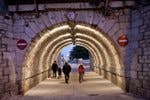LEC Lyon lights historic Nîmes conurbation roadways with LEDs
Lighting design firm Côté Lumière sought to "create an overall ambience at a human scale" in an outdoor lighting project in Nîmes, France that stretches 5 km from Nîmes station to the A9 Autoroute. The project utilized LEC Lyon LED luminaires to both implement marker lighting that's installed in the roadway curb and tunnel lighting that creates a welcoming ambiance to drivers, cyclists, and pedestrians.
LEC developed and manufactured customized product for both the roadway and tunnel lighting at the request of Côté Lumière. The designers demanded products that could maintain the historic aesthetic of the conurbation while also meeting the city's requirements in terms of light levels, minimal environmental impact, and long life with minimal maintenance.
The roadway, including traffic islands and roundabouts, is lit with LED-based spot lights that project a 2m strip of light onto the roadway (see nearby photo). About the installation, the designers, Patrice Eschasseriaux and Aurélien de Fursac, said "A rhythm is created along the roadway, as well as perspective, without producing adverse effects."
LEC manufactured the lights so that they could be adjusted after installation in the curb to ensure a uniform look along the roadway. Moreover, the city required fixtures that could be repaired if needed, and LEC delivered a modular design with removable and replaceable components.
Tunnel lighting
The tunnel lighting for both pedestrian paths and roadways, was intended to be different from the lighting that is typically found in such location. Indeed, the designers said, "We above all didn’t want to light it like a tunnel! It’s a nondescript place, but one where you could feel good and experience something."
LED and Côté Lumière worked together to create the 4040M spotlights that can be rotated on three axes. Moreover, the fixtures include customized elliptical lenses on the LEDs. Ultimately, the fixtures could be adjusted precisely to achieve the desired lighting effect.
As the nearby photo shows, the lights in tunnels are directed along the rounded inner surface of the walls and ceiling in cases where the tunnels are shaped like a half cylinder. In tunnels with rectangular features the lights are directed separately on ceilings and walls. In both cases, the installation provides the same rhythmic ambiance found in the marker lights.
"Our project was daring," said the design team. "We had to convince people that it made sense to customize spaces that were heavily travelled day to day, and it worked." The designers noted that the project countered the more common approach of using higher light levels and bathing areas with uniform light.







